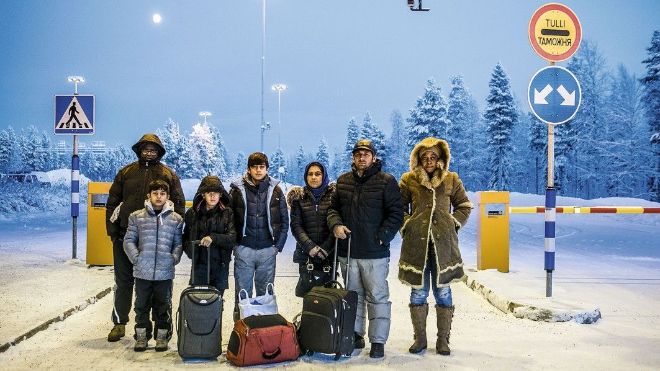About the group
Migration—the movement of people, ideas, texts, and elements of material and nonmaterial culture from one space to another, and crossing borders—have been fundamental for social development and shaping individual and collective identities. We are interested in representations of migration in various discourse types (e.g., political, journalistic, and academic) and narratives (e.g., literary fiction, movies, biographies, memoires, and travel literature). We link these interests to a few broad research questions:
How is individual and collective identity shaped, (re)constructed, and negotiated in discourses and narrations?
How do our perceptions of ourselves and others relate to cultural background and national belonging? What is the role of language in that context?
How does our perception of the other change across languages and cultures?
Specific subprojects, topics of interest, and questions examined include:
- Verbal, multimodal, and visual representation of migration in various discourses: the role of visual and multimodal symbols, metaphors, and metonymies and their identity-building force
- North/South relationships, exchanges, and migration across media, with a special focus on imagological and borealistic approaches to fiction and nonfiction narratives
- Mapping of migrant memories about urban landscapes or other places connected to the southern homeland and the new northern home
- Border poetics, border concepts, and border trauma in fictional and testimonial published migration narratives in Swedish and Norwegian
- Literary works and how they represent experiences of flight, displacement, homelessness, and identity loss; how they question the concepts of home, identity, and nation
- Linguistic and sociocultural issues in communication, in particular verbal and non-verbal forms of interaction in various discourse types and in narratives (e.g., fictional dialogues) seen from monolingual and cross-linguistic perspectives
- Children’s and young adult’s literature in Scandinavia and beyond (in particular, in southern Europe): circulation of texts and stories, their (de)formation, translation, and reception
Academic programs and courses
EUS4010 – Master's course Borders, Bodies, and Memories. Textual and cultural representation of contemporary migration in Europe. An interdisciplinary course offered for the first time at the University of Oslo in spring, 2018.
Subprojects, activities and outcomes
“Erratic bodies, transitional borders, and recent migration in Europe: Representation and identity negotiations in public discourse, literature, and the arts" September 27-28, 2018 at the University of Oslo.
"Temporalities and Subjectivities of Crossing: Contemporary Public Migration Narratives in Europe". An NOS-HS workshop series (2019-2020) led by the University of Oslo with partners from Dalarna University, The University of Jyväskylä and the University of Eastern Finland.
Publications (selection)
The book Representing 21st-Century Migration in Europe: Performing Borders, Identities and Texts published in 2022 (Berghahn Books) is a result of our collaborative activities.
Scandinavia through Sunglasses. Spaces of Cultural Exchange between Southern/Southeastern Europe and Nordic Countries. Peter Lang, 2019.
Voices of Supporters. Populist parties, social media and the 2019 European elections. John Benjamins, 2023. Migration is an important topic in this book.
Fellowships
Marie Skłodowska-Curie Action postdoctoral fellowships
The research group is interested in hosting Marie Skłodowska-Curie Action postdoc fellows from across the world, and has the capacity to work together with a limited number of qualified researchers on applications every year.
If you are interested, you must send us a concise project idea and an academic career plan (including your key qualifications, where you see yourself in ten years, and an explanation of how a stay at our department would help you develop your qualifications) by February 1st if you wish to be considered for working with us on an application the same year.
Doctoral projects
The research group's host department, ILOS, announces PhD fellowships annually. We welcome promising doctoral projects that align with the research areas of the group in the fields of South Slavic linguistics, Italian literature and linguistics, Spanish literature, and comparative literature.
Further information about the general process: Application and admission - PhD - Faculty of Humanities (uio.no).
-
Events
Book launch: REPRESENTING 21ST-CENTURY MIGRATION IN EUROPE
Performing Borders, Identities and Texts -
Guest lecture: Charlotte Taylor, Migration discourses and metaphor over time. Time and place: November 23rd, 2022, 3 pm; room 14, PAM.
-
Guest lecture: Dr. Barbara Siller, University College Cork: Kafka Tales of the Twenty-First Century.
Time and place: Mar. 30, 2023 2:15 PM–4:00 PM, Harriet Holters hus, seminarrom 038Dr. Barbara Siller will give a talk on “Kafka Tales of the Twenty-First Century – Doors, Walls, and Fences in The Gurugu Pledge (2017) by Juan Tomás Ávila Laurel and Lights in the Distance. Exile and Refuge at the Borders of Europe (2018) by Daniel Trilling”.
Arranged in collaboration with the research group Border Readings.
- Guest lecture: Melania Terrazas, Contested boundaries and uncharted entanglements in Evelyn Conlon’s Moving About the Place (2023)
Time and place: –
Arranged in collaboration with the research group Border Readings.
